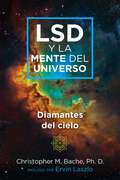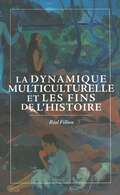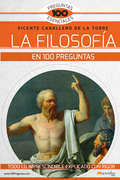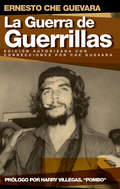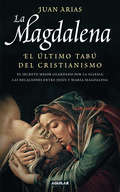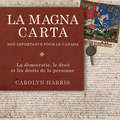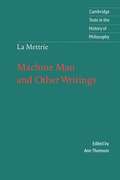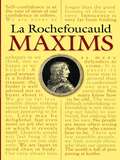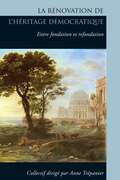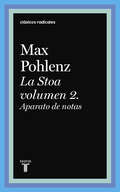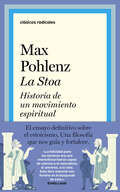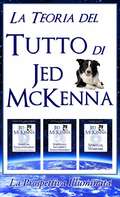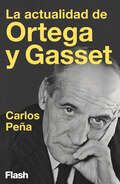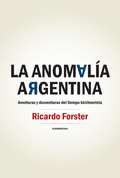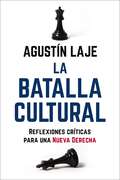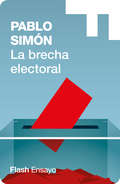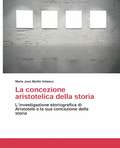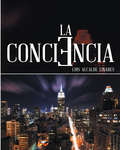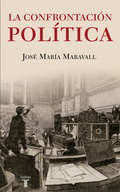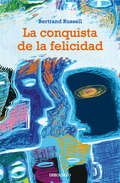- Table View
- List View
LSD y la mente del universo: Diamantes del cielo
by Christopher M. Bache• Crónicas, con un rigor sin precedentes, del viaje sistemático del autor hacia un campo unificado de consciencia que subyace en toda existencia física• Presenta argumentos poderosos a favor del valor de la experiencia espiritual inducida psicodélicamente y analiza el desafío de integrar estas experiencias en la vida cotidiana• Muestra cómo la experiencia psicodélica puede llevarte más allá de la autotransformación hacia una transformación colectiva y ayudar a que nazca el futuro de la humanidadEl 24 de noviembre de 1979, Christopher M. Bache dio el primer paso en lo que se convertiría en un viaje que cambiaría su vida. A partir de su formación como filósofo de la religión, Bache se propuso explorar su mente y la mente del universo de la manera más profunda y sistemática posible, con la ayuda de la droga psicodélica LSD. Siguiendo los protocolos establecidos por Stanislav Grof, las 73 sesiones de altas dosis de LSD de Bache a lo largo de 20 años lo llevaron a una comunión cada vez más profunda con la consciencia cósmica.Viaje junto al profesor Bache mientras toca la inteligencia viva de nuestro universo, una inteligencia que lo abrazó y lo aplastó, y demuestra cómo la experiencia directa de lo divino puede cambiar su perspectiva sobre temas centrales en filosofía y religión. Al narrar sus 73 sesiones, el autor revela la espiral de muerte y renacimiento que lo llevó a través del inconsciente colectivo hasta la inteligencia creativa del universo. Al defender poderosamente el valor de la experiencia espiritual inducida psicodélicamente, Bache comparte su inmersión en el amor feroz y la intención creativa del campo unificado de consciencia que subyace en toda existencia física. Describe el valor incalculable de aceptar el dolor y el sufrimiento que encontró en sus sesiones y los desafíos que enfrentó al integrar sus experiencias en su vida cotidiana. Su viaje documenta un cambio de la consciencia individual a la consciencia colectiva, de la realidad arquetípica a la unidad divina y la luminosidad diamante que se encuentra fuera de la existencia cíclica.Al ampliar los límites de la teoría y la práctica, el autor muestra cómo la experiencia psicodélica puede llevarte más allá de la autotransformación hacia la transformación colectiva, más allá del presente hacia el futuro, revelando espíritu y materia en perfecto equilibrio.
La Auto disciplina: Guía de acción para completar lo que empezaste e incrementar la fuerza de voluntad y cambiar tu vida
by Heather Erwin¿Está teniendo problemas para ganar tracción en su vida? ¿Ha estudiado lo que le retiene? Este libro es una solución a su problema. La autodisciplina es el puente que une sus pensamientos y acciones para lograr cualquier cosa. Para tener éxito, usted tiene un conjunto de hábitos que le sirven y lo impulsan hacia el éxito. Este libro es una guía para hacer exactamente eso. Si está leyendo esta descripción, no dude y hágase un mal servicio al no invertir en sí mismo y en su futuro. ¿Qué le parece despertarse y saber inconscientemente que su mente, cuerpo y alma están conectados para tener un gran día? En lugar de sentirse perdido, agotado y agobiado en el momento en que se despierta, ahora se siente agradecido, emocionado y entusiasmado por todas las cosas maravillosas que van a suceder ese día. ¿Qué pasaría si todo lo que necesitara fueran unos cuantos hábitos sencillos que le ayudaran a dejar de postergar y a alcanzar fácilmente sus metas diarias? No esperes más para descubrir SU LLAVE a una vida nueva y mejor.
La Biblia y sus secretos: Un viaje sin censura al libro más vendido del mundo
by Juan AriasUn viaje sin censura al libro más vendido del mundo. La Biblia es la gran novela de la Humanidad, con sus derrotas y sus victorias, su deseo de liberación de todas las esclavitudes y la constatación, al mismo tiempo, de que la vida no es más que un puñado de arena que se escapa, con asombrosa rapidez, por las rendijas del tiempo. Este libro surge del convencimiento de que la Biblia es capaz de «hablar» a todos, y de que quizás aún contenga más secretos de los que imaginamos. Con lenguaje divulgativo y a la vez con rigor cultural, trato de explicar a los lectores -y a mí mismo también- la apasionante historia, desde sus orígenes hasta la actualidad, de la más grande epopeya literaria y religiosa de todos los tiempos: la Biblia, el único libro declarado Patrimonio de la Humanidad.
La Dynamique multiculturelle et les fins de l’histoire (Philosophica)
by Réal FillionDans La dynamique multiculturelle et les fins de l'histoire, Réal Fillion propose une lecture originale de textes clés portant sur la philosophie de l'histoire signés par Kant, Hegel et Marx, et démontre que ces textes demeurent pertinents aujourd'hui pour comprendre l'histoire. Il présente les thèses de ces trois auteurs à propos de la dynamique et des fins de l'histoire afin de répondre à la question suivante : où allons-nous? Appuyant sa réponse sur le double constat que le monde devient de plus en plus multiculturel et de plus en plus unifié, Fillion réaffirme la tâche de la philosophie spéculative de l'histoire telle que l'avait comprise la philosophie allemande : il s'agit de comprendre et d'expliciter le processus historique en tant que tout en évolution. De sa compréhension de la dynamique du passé et du présent telle que présentée par Kant, Hegel et Marx, l'auteur considère plusieurs courants récents de la pensée sociale et politique afin de jeter un éclairage différent sur les événements actuels et les avenirs possibles. Il présente ainsi une réponse à la fois riche et actuelle à la question : où le monde actuel s'en va-t-il ? Publié en français
La Filosofía en 100 preguntas (100 Preguntas esenciales)
by Vicente Caballero de la TorreLos temas clave para sumergirse en el apasionante y complejo mundo de la Filosofía, ordenados por temas y descritos con rigor académico en un lenguaje ameno y divulgativo. ¿Qué es la Filosofía?, metafísica, ontología, los límites del conocimiento, el hombre en el cosmos, filosofía de la religión, filosofía y economía, sociedad y política, arte y estética. Todas las respuestas a las preguntas que siempre se ha hecho. ¿Sabías que la filosofía oriental está tan de moda porque vivimos en tiempos de crisis?, ¿Existe Dios o nos lo hemos inventado?, ¿Cómo podemos distinguir las paraciencias de las ciencias?, ¿Qué quiso decir Descartes con su «Pienso, luego existo»?, ¿Tenemos un cuerpo o somos nuestro cuerpo?, ¿Somos realmente libres o la libertad es una ilusión?, ¿Se pueden educar las emociones?, ¿Necesitamos realmente vivir en sociedad o estaríamos mejor en soledad?, ¿Será posible la paz para siempre?, ¿Sabías que los economistas discuten más por Filosofía que por Economía?, ¿Hay una belleza objetiva o cualquier cosa puede ser bella para alguien y fea para otro?
La Guerra de Guerrillas
by Ernesto Che GuevaraA bestselling Che classic for decades, this is Che Guevara's own incisive analysis of the Cuban revolution-a text studied by his admirers and adversaries alike. Here he explains how a small, dedicated group grew in strength and with the support of the Cuban people was able to defeat a dictator's army.
La Guerra y La Paz: Paz Para El Mundo
by André CronjeLA GUERRA Y LA PAZ Presenta más de 500 citas sobre la belleza de la paz mundial, la paz interior y la paz con Dios en medio de las cenizas de la guerra, los puentes quemados y las promesas incumplidas.
La Magdalena. El último tabú del cristianismo: El secreto mejor guardado por la Iglesia: las relaciones entre Jesús y María Magadalena
by Juan AriasJuan Arias nos ofrece en este libro una hipótesis muy bien documentada: La Magdalena vivió con Jesús una apasionada historia de amor. María Magdalena fue la mujer escogida por Jesús de Nazaret como primera destinataria de sus revelaciones y los secretos de su sabiduría, y el entorno de Jesús no entendió por qué confió a ella secretos que escondía a sus discípulos más cercanos. Según los evangelios, Jesús resucitado apareció ante ella en primer lugar y, como mensajera, la envió a comunicar la importante noticia a Pedro y a los demás apóstoles, escondidos y atemorizados tras la crucifixión. Desde los orígenes del cristianismo se tejió en torno a María Magdalena una tupida red de leyendas y falsedades. La intención podría haber sido ocultar su verdadera identidad y quizá rebajar o eliminar el papel fundamental que ella debería haber tenido y no tuvo en la fundación de la nueva religión. La Iglesia siempre tuvo miedo del personaje, puesto que, a juzgar por los textos, María de Magdala aparecía asociada afectivamente a Jesús y este hecho podría hacer tambalear los cimientos de la institución.
La Magna Carta, son importance pour le Canada: La démocratie, le droit et les droits de la personne
by Carolyn HarrisLa Magna Carta avait été conçue au départ dans le but d’assurer que le roi Jean respecte les us et coutumes de la noblesse au XIIIe siècle. Au cours des huit cents années qui se sont écoulées depuis sa création, elle est devenue la pierre angulaire des idéaux de la démocratie pour tous. La « Grande Charte » a inspiré de nombreux documents portant sur le respect des droits de la personne, y compris la Déclaration d’indépendance des États-Unis, la Déclaration des droits de l’homme et du citoyen de la France, et la Déclaration universelle des droits de l’homme des Nations Unies. Pour les Canadiens, la Magna Carta a servi de modèle pour d’importants documents, depuis la Proclamation royale de 1763, qui a façonné les colonies britanniques de l’époque et les relations de celles-ci avec les Premières Nations, jusqu’à la Charte des droits et libertés. La Magna Carta : son importance pour le Canada est une célébration des huit cents années d’existence du document ainsi que de son influence sur le Canada et le monde entier.
La Mettrie: Machine Man and Other Writings
by Karl Ameriks Desmond M. Clarke Ann Thomson Julien Offray de La MettrieJulien Offray de La Mettrie (1709-51), author of Man a Machine (1747), was the most uncompromising of the materialists of the eighteenth century, and the provocative title of his work ensured it a success. This fully annotated edition presents a new English translation of the text together with the most important of La Mettrie's other philosophical works, translated into English for the first time. Ann Thomson's introduction examines his aims and the scandalous moral consequences which he drew from his materialism.
La Muerta y la Doncella
by Ariel DorfmanLa muerte y la doncella, la obra latinoamericana mas representada en la historia del mundo, ha llegado a constituirse en un clasico sobre la justicia y el perdon, la memoria y el olvido. Dorfman se ha propuesto a explorar preguntas pocas veces hechas en voz alta: "¿Como pueden los represores y los oprimidos cohabitar una misma tierra, compartir una misma mesa?" preguntas que hoy dîa siguen tan vigentes como cuando Dorfman escribia esta obra.
La Rochefoucauld Maxims
by John Heard Jr. La RochefoucauldAfter abandoning politics when he was about forty, François, duc de La Rochefoucauld (1613-1680) began to write down his maxims, which were first published in book form in 1665. Poetic, ironic, and frequently humorous, his wise observations can also be blunt and brutally candid:Everyone blames his memory, no one his judgment.Gratitude is merely the secret hope of further favors.It is often merely for an excuse that we say things are impossibleWe rarely think people have good sense unless they agree with us.The more than 500 brief musings included here make for entertaining and thought-provoking reading. This invaluable collection will also serve as a sourcebook for writers, speakers, or anyone who needs a quick quip.
La Rénovation de l'héritage démocratique: Entre fondation et refondation
by Anne TrépanierLes expressions politiques du Québec et du Canada donnent l’impression d’une quête identitaire perpétuelle. L’obsession du moi est passée du « je » au « nous ». Ce collectif pluridisciplinaire donne une portée philosophique et historique à la question du renouveau démocratique au Québec et au Canada. La tension entre les identités citoyennes et les identités des groupes exige l’émergence ou la renaissance d’un référent politique collectif et invite à la reformulation du credo identitaire, à la rénovation de l’héritage commun. Cet ouvrage examine la nature de ce mouvement de refondation et regarde comment le groupe est convié à participer à cet exercice de se nommer. Publié en français
La Stoa volumen 2. Aparato de notas
by Max PohlenzUn complemento para quienes quieren profundizar en la obra La Stoa, de Max Pohlenz. Tradicionalmente, las sucesivas ediciones en alemán de La Stoa, de Max Pohlenz, se han publicado en dos volúmenes, uno dedicado al texto general y otro exclusivamente dedicado al amplio aparato de notas. La edición publicada en papel en Taurus (la primera que se publica en castellano) corresponde al primero, pero este ebook de acceso gratuito pone las notas (es decir, el segundo volumen) a disposición de cualquier lectora. Asimismo, el aparato de notas está disponible en la versión digital del libro completo.
La Stoa: Historia de un movimiento espiritual
by Max PohlenzEl ensayo definitivo sobre el estoicismo, una filosofía que nos guía y fortalece. Este libro, nunca antes traducido al castellano, es la síntesis más completa del estoicismo, ese grandioso movimiento filosófico y espiritual nacido en Grecia que, con sus ideales de perfección moral y con su poderoso mensaje sobre el destino del ser humano en el cosmos, conquistó la cultura antigua, con particular éxito a Roma, y ejerció una gran influencia no solo en las corrientes filosóficas y religiosas de la Antigüedad tardía sino también en la Edad Moderna. La crítica ha dicho:«La felicidad para los estoicos era una maravillosa fuerza capaz de unirnos a la naturaleza, al universo, a la vida. Este libro esencial nos ilumina en la búsqueda de esta.»Emilio Lledó
La Teoria del Tutto di Jed McKenna La Prospettiva Illuminata
by Gloria Corsini Jed MckennaI libri di Jed McKenna sono stati i classici sotterranei iniziando dal primo nel 2001. Ora che entrambe le trilogie sono complete stiamo spingendo in modo importante a livello mondiale per aiutare questi libri a realizzare il loro pieno potenziale accanto a Tolle, Walsch, Chopra e altri che dominano il mercato spirituale globale. Questo progetto può farti guadagnare significativi crescenti diritti d'autore. Visita il nostro sito web e vedi da solo.
La actualidad de Ortega y Gasset
by Carlos PeñaUna invitación a descubrir la trayectoria vital e intelectual del pensador y ensayista más moderno, estimulante y perdurable de la España del siglo XX. «Si hubiera sido francés, sería Sartre; si inglés, Russell; si alemán, Heidegger.Pero fue español. Se llamaba José Ortega y Gasset.» Ortega y Gasset es uno de esos nombres que todos conocemos, pero del que poco podemos decir al respecto. Lo mismo pasa con otros gigantes de la filosofía como Descartes, Kant o Hegel. En este texto, Carlos Peña, doctor en Filosofía y rector de la Universidad Diego Portales, pone remedio al desconocimiento general de este autor y ofrece una aproximación cuidada y rigurosa a su trayectoria a la vez que reivindica la importancia del pensamiento de José Ortega y Gasset a pesar de sus claroscuros. Hijo de su tiempo y de sus circunstancias, Ortega y Gasset consiguió algo muy difícil: que brotasenideas filosóficas en una España en crisis. Fue un pensador público que confiaba en sustraer el discurso filosófico de la academia y el lenguaje elevado para acercarlo a las plazas y a su gente. Por eso nunca dudó ante la oportunidad de tomar la palabra en público e iluminar a su audiencia sobre cualquier tema. Defensor de la idea de Europa, su trabajo demuestra el compromiso vital por construir una España activa y despierta, llena de ideas y apostando por una acérrima obertura de europeización de la cultura española. Es tarea nuestra, leyéndolo y transmitiendo la validez y actualidad de su pensamiento, evitar que el gran Ortega y Gasset caiga en el olvido, porque filósofos de tal calibre no se encuentran cada día. Reseñas:«No siempre se le puede mirar de frente, no siempre se le puede interpretar con la razón racionalista. Hay que entenderlo poéticamente, hay que mirarlo de soslayo, hay que mirar sus sentimientos. No es solo un ente racional».Javier Zamora «Una personalidad muy incómoda para el régimen franquista y muy admirada por los universitarios y por la intelectualidad extranjera».Nieves Concostrina «El suyo fue un pensamiento disruptivo, un ejercicio a contracorriente. [...] Ortega era, además, un tipo que comprendía que los intransigentes no son quienes tienen una mayor estima por sus propias ideas. [...] El conjunto de su obra se caracteriza más bien por disparar, desprejuiciado y sin trinchera, contra todo y contra todos».Gonzalo Cachero, Ethic
La anomalía argentina: Aventuras y desventuras del tiempo kirchnerista
by Ricardo Forster«Con valentía y agudeza, Ricardo Forster revisa en estos textos,escritos ante las demandas de intervención pública y las exigencias delcombate cultural, los nudos centrales de la historia política nacionalde años kirchneristas». Argentina ha sido, y sigue siendo, una anomalía, el largo zigzagueo deun país extraño que suele desbaratar cualquier anticipación o cualquierprejuicio respecto a su itinerario actual o a los modos en los que sedesplegó en el pasado.Estas páginas nacieron de las urgencias y de los reclamos de unarealidad siempre en movimiento espasmódico, siempre quebrando loesperado y abriéndose a inquietantes novedades que suelen conmover loconocido y lo previamente arraigado en el sentido común.Los temas tratados van desde el inesperado conflicto generado por ladisputa en torno de la renta agraria, pasando por el histórico debatesobre una nueva ley de medios -que fisuró el bloque hegemónico de lacomunicación, desmontando el relato de la corporación mediática-, hastala importancia de medidas como la reestatización del sistemajubilatorio, la política de derechos humanos, el impulsolatinoamericanista o la asignación universal por hijo.
La arquitectura de la felicidad
by Alain de BottonAlternando ideas y anécdotas sabrosas, Alain de Botton nos ofrece un libro que habla de arquitectura, pero habla sobre todo de lo que nos falta y a menudo nos sobra para llegar a la auténtica felicidad. Si es verdad que somos lo que comemos, también es cierto que somos lo que habitamos, y basta con entrar en una casa para saber no solo qué posee, sino qué esconde y qué desea su dueño. La felicidad depende de la idea que tenemos de nosotros mismos, de la capacidad de casar lo que es con lo que debería ser, y eso se refleja en los objetos que nos rodean. Así es desde tiempos inmemoriales, y Alain de Botton nos lleva de la mano para que revisemos bajo esta óptica un tanto insólita los edificios que han marcado la historia de la arquitectura, desde la Villa Rotonda de Palladio hasta las casas funcionales de Le Corbusier y los rascacielos de Jean Nouvel. Stendhal dijo que la belleza es una promesa de felicidad, y cada cual tiene una idea de belleza de acuerdo con la época y las circunstancias en que le ha tocado vivir. Por eso lo que fue hermoso un tiempo, ahora no puede reproducirse tal cual sin que nos parezca inadecuado. Cierta innovación se impone, pero hay elementos arquitectónicos que se repiten a lo largo de los siglos porque responden a las necesidades hondas de los humanos, y el camino de la felicidad se apoya en ellos: en la simetría, por ejemplo, o en las curvas de ciertos objetos. Donde esté la disposición adecuada de líneas y trazos, estará nuestro hábitat ideal, ese lugar al que nos gusta volver porque ahí reencontramos lo mejor de nosotros mismos. Reseña:«Para Botton, la arquitectura y el diseño son algo intensamente personal. Los edificios tienen carácter, vicios y virtudes, miran al mundo con una cara casi humana.»William Grietes, The New York Times «De Botton tiene una maravillosa habilidad para abordar temas de peso desde puntos de vista amenos y excéntricos.»The Seattle Times «Un libro elegante e [...] inusual, lleno de grandes ideas. [...] Rara vez ha habido un matrimonio más delicado de palabras e imágenes.»The New York Sun «Con originalidad, brío e ingenio, De Botton explica cómo encontramos reflejos de nuestros propios valores en los edificios que construimos.»San Francisco Chronicle «De Botton mantiene la arquitectura a una escala humana.»Los Angeles Times «Alain de Botton ha devuelto a la filosofía su propósito más importante: ayudarnos a vivir mejor».Christina Hardyment, The Independent
La batalla cultural: Reflexiones críticas para una Nueva Derecha
by Agustin LajeEl afamado escritor, politólogo, y conferencista Agustín Laje presenta La batalla cultural: Reflexiones críticas para una Nueva Derecha – un manifiesto que informará, animará y facultará a los &“guerrilleros culturales&” para no bajar los brazos en la batalla que sigue perjudicando a nuestras familias y a la sociedad en general.En el mundo contemporáneo, la sociedad y la cultura cambian a gran velocidad. La voluntad de dirigir esos cambios está en la base de las batallas culturales que hoy se viven en todas partes. Bien investigado y argumentado inteligentemente, este libro define el concepto de batalla cultural y muestra hasta qué punto la cultura ha llegado a ser el botín principal del poder, cómo se han desarrollado estas batallas desde los tiempos modernos hasta la actual posmodernidad y cómo enfrentarlas.En este libro, Agustín Laje:Explica qué es la batalla cultural, cómo darla, y cuales son su característicasAnaliza cómo la nueva izquierda entendió este fenómeno, frente a una derecha que menospreció el poder de la culturaExamina cómo entendió este fenómeno la nueva izquierda, frente a una derecha que menospreció el poder de la culturaPretende brindar las herramientas necesarias para el nacimiento de una nueva derechaEste libro está dirigido a: Las familias que son el principal blanco de ataque en este momento, que se sienten fragmentadas, amedrentadas y que quieren hacer algo más para convertirse en agentes de batalla culturalA los Jóvenes que cursan sus estudios y que entienden que en sus universidades cada vez hay menos educación y más adoctrinamientoA todo aquel que se preocupa por los asuntos políticos y mundiales de gran magnitud que crean conflictos en la sociedad&“La lucha política y la lucha cultural son las dos caras de una misma moneda. Si no hay política sin hegemonía, entonces tampoco hay política sin batalla cultural&”, dice Laje. &“La batalla cultural terminará mostrándose como la madre de todas las batallas.&”The Culture BattleFamed writer, political scientist, and lecturer Agustín Laje presents The Culture Battle: Critical Reflections for a New Right – a manifesto that will inform, encourage and empower the &“cultural guerrillas&” not to give up in the battle that continues to harm our families and society in general.In the contemporary world, society and culture are changing at great speed. The will to lead these changes is at the basis of the cultural battles that are being fought everywhere today. Well researched and intelligently argued, this book defines the concept of cultural battle and shows to what extent culture has become the main spoils of power, how these battles have developed from modern times to today's postmodernity and how to face them.In this book, Agustín Laje:Explains what the culture battle is, how to wage it, and what its characteristics areAnalyzes how the new left understood this phenomenon, in the face of a right wing that underestimated the power of cultureExamines how the new left understood this phenomenon, in the face of a right wing that underestimated the power of cultureAims to provide the necessary tools for the birth of a new right wing
La brecha electoral
by Pablo SimónPablo Simón recoge las claves necesarias para enfrentarse a votar con conocimiento de causa. ¿Qué necesitas saber ante unas inminentes elecciones? Cuando vas a darle tu voto a un partido, ¿lo haces mirando hacia los proyectos fracasados o de cara a las promesas del futuro? Todo depende del contexto. Es necesario mantenerse informado, teniendo en cuenta los errores cometidos y pensar en si existe la posibilidad de que se repitan o no. ¿Cómo afectan las brechas sociales, económicas y políticas en los resultados de las elecciones de una sociedad fragmentada?
La concezione aristotelica della storia
by María José Martín VelascoNei paesaggi conosciuti della Poetica (Po. 1451a36-b11 e 1459a17-32) Aristotele rifiuta in anticipo la possibilità di fare la scienza della storia. La storia intesa come l'investigazione dei fatti umani è considerata una fase anteriore alla conoscenza scientifica che, per sua propria naturalezza, non può arrivare ad essere oggetto di generalizzazione. Queste affermazioni contrastano con il fatto che Aristotele si dedicasse durante tutta la sua vita al lavoro di investigazione storica, della quale conserviamo delle ampie referenze da altri autori e delle allusioni nelle sue opere, specialmente nella Politica, nella Retorica e nei trattati di etica. E' per questo di grande importanza studiare in che modo Aristotele si avvicina a tutta questa informazione e qual' è il trattamento che si fa di questa nel complesso della sua filosofia.
La conciencia
by Luis Alcalde Linares«Los seres humanos estamos regulados por el karma y la conciencia que es la que determina nuestras acciones.» <P><P>A lo largo de la historia ha habido grandes escritores, desde los clásicos hasta nuestros días, pasando por el renacimiento, pero nunca se ha abordado temas tan transcendentes como son los misterios que acontecen al ser humano, como puede ser la conciencia, el karma o la energía y el alma. <P>Con este libro he querido tratar de desvelar alguno de esos misterios que están presentes en nuestras vidas.
La confrontación política
by José María MaravallUn texto imprescindible para entender la política en las democracias, así como los fundamentos del gobierno representativo. Sólo un autor del perfil de Maravall, que combina una importante labor investigadora y docente como catedrático de Sociología y una larga experiencia política, puede ofrecer un enfoque tan completo.Este libro estudia estrategias de los políticos para detentar el poder y disponer de autonomía respecto de los ciudadanos. <p><p> La primera cuestión analizada es la de la crispación y sus consecuencias sobre la política democrática. ¿Por qué razones unos políticos rechazan estrategias de convergencia y moderación, en busca del voto de la mayoría, y optan por una polarización radical de la competición electoral? <p>La segunda cuestión consiste en las razones por las que se anticipan las elecciones. El momento en que éstas se celebran constituye una decisión discrecional de los primeros ministros en la mayoría abrumadora de las democracias parlamentarias. ¿Cómo cabe explicar este adelanto? ¿Qué efecto tiene en los resultados electorales que los primeros ministros decidan cuándo se van a someter al juicio de los ciudadanos? <p>La tercera cuestión se refiere a las razones por las que los primeros ministros pierden el poder. Con mucha frecuencia, esto no se debe a derrotas electorales sino a conspiraciones. ¿En qué medida votantes y políticos coinciden en sus criterios al echar a un primer ministro? ¿De qué recursos dispone éste para hacer frente a las conspiraciones? ¿Cómo afecta todo ello a los intereses de los ciudadanos?
La conquista de la felicidad (Nueva Austral Ser. #Vol. 189)
by Bertrand RussellLa felicidad ¿es un estado o una búsqueda? Esta obra afirma que lo segundo: el ser humano se debe mostrar activo en la eliminación de las trabas al despliegue de la felicidad, comenzando por eliminar esas pasiones egocéntricas que son la envidia, el miedo o la conciencia de pecado y reforzando las que impulsan hacia fuera de sí mismo, que invitan a sentirse parte de la corriente de la vida: «Cuantas más cosas interesen a alguien, más oportunidades de felicidad tendrá», afirma, para concluir que el ser feliz es el que se siente ciudadano del universo "y goza libremente del espectáculo que le ofrece y de las alegrías que le brinda". Una obra de autoayuda... si no fuera porque se trata de un proyecto, de raigambre estoica, de repensar el ser humano y su posición en el mundo.
